
Chronicle of Xi's Leadership in China's War Against Coronavirus
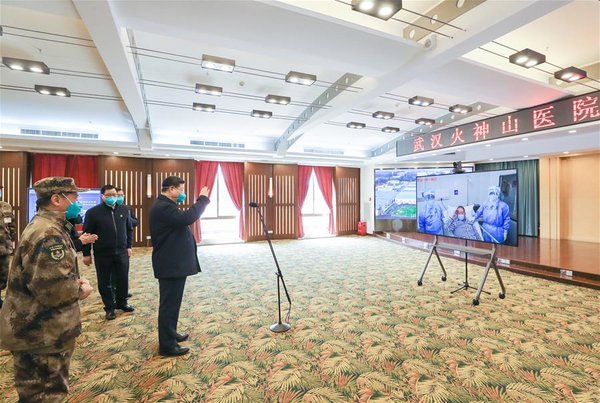
Xi Jinping speaks with a patient and medical workers by video link at Huoshenshan Hospital in Wuhan, central China's Hubei Province, March 10, 2020. Xi went to Wuhan on March 10 to inspect COVID-19 prevention and control work there. [Xinhua/Ju Peng]
BEIJING, Sept. 7 (Xinhua) — On March 10, 2020, at Huoshenshan Hospital in Wuhan, Chinese President Xi Jinping — wearing a mask — spoke to a patient lying in bed by video link.
"What you should do now is to stay confident. We all should be confident that we will win this war," Xi said. "Victory for Wuhan, victory for Hubei, and victory for China!"
Xi, also general secretary of the Communist Party of China (CPC) Central Committee and chairman of the Central Military Commission, appeared at a critical place — Wuhan, the Chinese city hit hardest by the COVID-19 outbreak at the time.
Eight days after Xi's visit, the city reported no new cases for the first time. On April 26, Wuhan hospitals cleared all COVID-19 cases.
Over the past seven-plus months, China — the world's most populous nation — has gone through an extraordinary time. More than 80,000 Chinese were infected by the virus and about 4,700 people lost their lives. Epidemic control became the country's top priority.
During the Spring Festival holiday starting in late January, hundreds of millions of people abandoned their holiday plans. They stayed at home for weeks in a row. Cities were locked down, businesses were closed and public gatherings were canceled.
The annual sessions of the national legislature and the national political advisory body — a key event on the country's political calendar known as the "two sessions" — were postponed for the first time due to a public health emergency.
Xi said the epidemic was the fastest spreading, most extensive and most challenging public health emergency the country had encountered since the founding of the People's Republic of China in 1949.
"Life is of paramount importance," Xi said. He launched a "people's war" and personally took charge of the response, marshaling national resources to fight the "invisible enemy."
In little more than a month, the rising spread of the virus was contained; in around two months, the daily increase in domestic coronavirus cases fell to single digits; and in approximately three months, a decisive victory was secured in the battle to defend Hubei Province and its capital city of Wuhan — a major achievement of strategic importance in the nationwide fight against COVID-19.
Though there were a handful of sporadic outbreaks over the past few months, the Chinese government — with its experience and targeted measures — managed to break the transmission routes quickly.
From a global perspective, China was among the first countries to resume work and reopen schools and businesses. The country is now racing against the clock to win its anti-poverty fight and achieve a moderately prosperous society in all respects.
Leadership in Times of Crisis
The COVID-19 epidemic changed Xi's schedule. People familiar with his work said Xi dedicated himself to leading epidemic control efforts and gave instructions every day at the height of the outbreak.
Xi devised a set of general principles to guide the fight against the virus, emphasizing "remaining confident, coming together in solidarity, adopting a science-based approach and taking targeted measures."
On Jan. 7, when Xi chaired a meeting of the Standing Committee of the Political Bureau of the CPC Central Committee, he underlined the importance of properly handling the epidemic — known then as "an epidemic of pneumonia of unknown cause."
On Jan. 20, Xi gave important instructions on fighting the epidemic, emphasizing that people's lives and health must come first and resolute efforts should be made to stem the spread of the virus. He also called for the prompt release of information on the epidemic and enhanced international cooperation.
On Jan. 22, Xi ordered the immediate imposition of tight restrictions on the movement of people and channels of exit in Hubei and Wuhan. Xi said making the decision required enormous political courage. "But time calls for resolute action. Otherwise, there would be trouble," he said.
On Jan. 23, Wuhan suspended all urban public transportation and cut off outbound flights and trains. Putting a megacity with over 10 million residents under lockdown was unprecedented, but crucial.
Since the 18th CPC National Congress in 2012, Xi has repeatedly stressed that cadres must have a strong sense of responsibility. "Stay loyal to the Party, strive for people's well-being, work hard..." These are the consistent tenets upheld in various Party endeavors.
Xi did not sleep well on Chinese New Year's Eve as he shouldered the heavy responsibility to fight the epidemic.
The next day, Jan. 25, Xi convened a meeting of the Standing Committee of the Political Bureau of the CPC Central Committee on epidemic control. He told his six colleagues on the standing committee that the situation was pressing and they needed to study the issue together.
Xi took the lead in making a donation to support epidemic control efforts. He said the principle of early detection, reporting, quarantine and treatment must be strictly observed. And he called for saving lives by raising admission and cure rates and lowering infection and fatality rates.
Xi made specific response demands at different stages of the battle. Since the start of the outbreak, he has chaired a great number of high-level meetings to devise containment measures. These included 17 meetings of the Standing Committee of the Political Bureau of the CPC Central Committee, four meetings of the Political Bureau of the CPC Central Committee, and leadership meetings on law-based governance, cyberspace affairs, foreign affairs and the deepening of reform amid the epidemic.
He also instructed the military to join the fight and chaired a series of symposiums, including one with non-CPC members to hear their suggestions and another with experts on building a strong public health system.
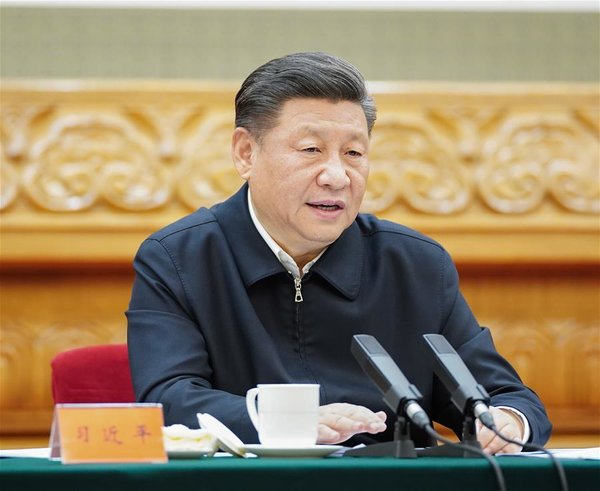
Xi Jinping delivers an important speech at a meeting to advance the work on coordinating the prevention and control of COVID-19 and economic and social development, in Beijing, capital of China, Feb. 23, 2020. [Xinhua/Ju Peng]
He convened large teleconferences, one of which was the largest held in China since 1949. It was attended by 170,000 officials from central leadership down to county-level units across the country.
Xi also carried out nine domestic inspections to guide epidemic control, economic development and other work: two in Beijing, one in Wuhan and the other six in Zhejiang, Shaanxi, Shanxi, Jilin and Anhui provinces, as well as Ningxia Hui Autonomous Region.
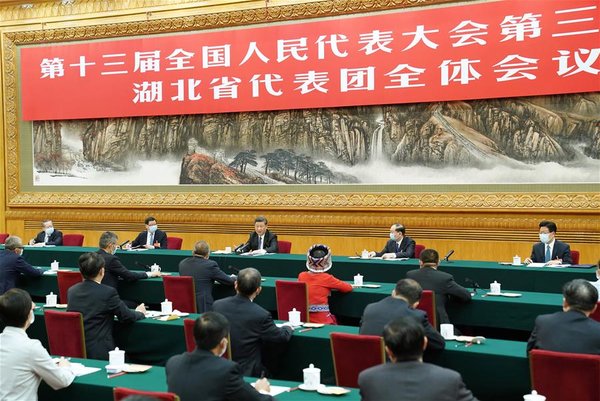
Xi Jinping joins a deliberation with deputies from Hubei Province at the third session of the 13th National People's Congress (NPC) in Beijing, capital of China, May 24, 2020. [Xinhua/Huang Jingwen]
At the postponed "two sessions" in late May, Xi joined political advisors and lawmakers in four group discussions to plan epidemic control and economic development measures.
World Health Organization (WHO) Director-General Tedros Adhanom Ghebreyesus said when he was in Beijing, he saw President Xi lead China's efforts to mobilize the government and society and to make the response every citizen's business.
Political observer Eric Li wrote in an article posted on the website of Foreign Policy, a U.S. magazine, that the decision to lock down Wuhan and Hubei turned out to be one that saved the nation from a devastating catastrophe.
Namibian President Hage Geingob said Xi has led the Chinese people in waging an effective fight against COVID-19, which has demonstrated outstanding leadership and been highly appreciated by countries around the world, including those from Africa.
In a letter to Xi, 18 CEOs of the Global CEO Council said China, under Xi's strong leadership, has rapidly contained the coronavirus epidemic, taken the lead in resuming work and production, and played a positive role in supporting the global COVID-19 fight and maintaining world economic stability.
Institutionals Strengths Given Full Play
Xi stressed that it is imperative to coordinate national response measures to fight the outbreak, adding that concentrating strength to accomplish big tasks is an advantage of China's socialist system.
Support was summoned from across the nation. All jumped into action after Xi, as the leadership core of the CPC Central Committee and the Party, issued his orders.
A central leading group on the epidemic response was set up on Jan. 25. Vice Premier Sun Chunlan, a member of the Political Bureau of the CPC Central Committee, led a central guiding group to oversee work on the ground in Hubei for three months.
"Whatever situations it encounters or whatever needs it has, the group can directly phone me," said Xi, who made more than 100 instructions to the group.
Under Xi's leadership, more than 90 million CPC members and 4.6 million grassroots Party organizations joined the battle.
"The general secretary says the interests of the people come above all else. We, as Party members, must be at the forefront," said Xia Jian, secretary of a Party branch at Zhongnan Hospital of Wuhan University.
Some lost their lives after they were infected on the front line while attending to patients. Liu Zhiming, president of Wuchang Hospital, and Li Wenliang, an ophthalmologist at the Central Hospital of Wuhan, were among the fallen heroes honored as martyrs, a title given to citizens who bravely sacrifice their lives for the nation and the people.
Employees who are Party members also took the lead to work around the clock in fields closely connected with epidemic control such as building hospitals and producing masks.
Heeding Xi's order, the military sent its first group of medics to Wuhan on Chinese New Year's Eve. In total, three groups involving over 4,000 service personnel were dispatched. Supplies were airlifted to Wuhan by large transport aircraft.
China mobilized the best doctors, the most advanced equipment and the most needed resources to assist the all-out fight against the virus in Hubei and Wuhan, with all treatment expenses covered by the government, Xi said during the "two sessions."
Robert Kuhn, a leading U.S. scholar on China studies and chairman of the Kuhn Foundation, described China's mobilization as "unprecedented" in global health history.
Across China, over 42,000 medical workers, including academicians and top experts, were sent to Hubei. They endured tremendous fatigue and stress, and paid a heavy price. More than 2,000 medical workers were infected, and scores died in the line of duty.
In Wuhan, 16 exhibition halls and sports venues were converted into makeshift hospitals. Dozens of hospitals were repurposed. More than 600 venues were used for quarantine sites. All these measures helped add about 3,000 beds on a daily basis, easing the strain on hospital beds in the city.
"The key learning from China is speed," said Canadian epidemiologist Bruce Aylward, who led a team of WHO-organized international experts to China for a nine-day joint mission on COVID-19 in February.
Outside the hard-hit zone, the manufacturing of medical supplies was cranked up and "green passages" were opened. In a short time, everything from masks to life support equipment was rushed to the front line.
At the height of the outbreak, Hubei accumulated more than 100 extracorporeal membrane oxygenation (ECMO) machines, about a quarter of the nation's total of these sophisticated life support systems.
Xi ordered leveraging the country's institutional strength of "pairing" support. Nineteen provincial regions were "paired" with 16 cities and prefectures in Hubei to help them contain the outbreak.
Xi said science and technology hold the key to "eventually prevailing over the outbreak." He demanded research to be fast-tracked to solve key issues while meeting all safety standards.
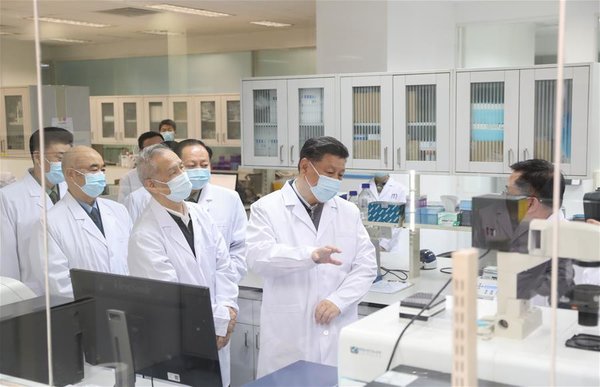
Xi Jinping learns about the progress on the vaccine and anti-body research during his visit to the Academy of Military Medical Sciences in Beijing, capital of China, March 2, 2020. Xi inspected the scientific research on COVID-19 in Beijing on March 2. [Xinhua/Ding Haitao]
Universities, research institutes and businesses across the country joined forces to develop vaccines, medicines and treatment. A vaccine developed by Chinese researchers was the world's first to enter phase-two clinical trials on April 12. By July 23, nine enterprises in China had started clinical trials of COVID-19 vaccines. The emergency use of COVID-19 vaccines has also started.
In a country with a huge population of 1.4 billion, people acted orderly; they took the Party and government's advice seriously, staying at home for weeks and practicing social distancing.
Over 4 million community workers were mobilized to regularly disinfect public spaces, check body temperatures, and register visitors and take them to quarantine if necessary.
Grid management and neighborhood watches were initiated in some cities to detect and isolate suspected cases and their close contacts as soon as possible. Many volunteers showed up to help.
"Communities have made huge contributions in this epidemic response," Xi told community workers during a tree-planting activity in Beijing. "Looking forward, there are still formidable tasks ahead."
China's approach, truly mobilizing all of government and all of society, is estimated to have averted hundreds of thousands of COVID-19 cases, according to a report by the WHO-China Joint Mission on COVID-19.
International medical journal The Lancet said there are important lessons that presidents and prime ministers can learn from China's experience, highlighting the role of public health measures, such as surveillance and exhaustive contact tracing, in delaying the spread of infection.
China's COVID-19 fight offers three important pieces of experience to the world: talk to the public, slow the transmission of the disease, and prepare health systems for a spike in demand, according to the London-based magazine The Economist.
People First
In essence, what Xi commands is a "people's war." By and large, it is a war waged by the people and for the people, embodying the fundamental purpose of the CPC, the world's largest ruling political party — to serve the people wholeheartedly.
"People" is the most prominent recurring word in the meetings he chaired and the instructions he issued.
Xi has stressed putting people's lives and health first and placing their interests above anything else. He demanded closely relying on the people to win the war. He also said all prevention and control measures of the CPC Central Committee were taken with the primary consideration of preventing infections among the people and saving lives.
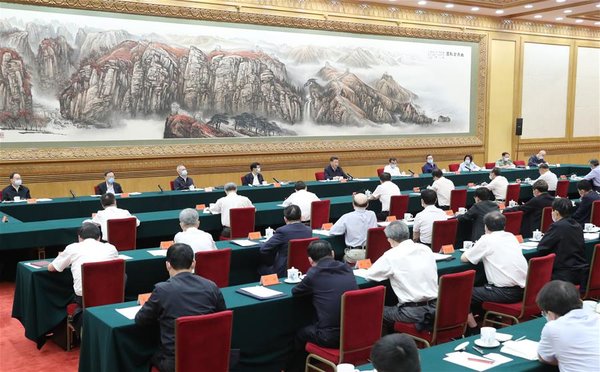
Xi Jinping presides over a symposium attended by experts and scholars in Beijing, capital of China, June 2, 2020. "Only by developing a strong public health system, improving the early warning and response mechanisms, comprehensively enhancing the capacity for prevention, control and treatment, weaving a tight prevention and control network, and consolidating the wall of quarantine, can we provide a strong guarantee for safeguarding the people's health," Xi said. [Xinhua/Yao Dawei]
China has made COVID-19 treatment free, pledging to treat every patient and leave no one unattended.
The oldest COVID-19 patient saved in China is 108 years old.
"We saved lives at all costs. We never gave up no matter how old a patient was or how serious their condition was," Xi said.
Jiao Yahui, an official with the National Health Commission, said the elderly were among the most difficult to treat and required more medical resources than others.
"But China has given every patient equal treatment, in disregard of their age or wealth," she said, adding that this reflects the traditional Chinese virtues Xi has emphasized that put people first in state governance.
Jiao said China has far fewer COVID-19 cases and deaths than major developed nations in Europe and North America.
Xi developed close ties to the people early in life. At 15, he went to the village of Liangjiahe in Shaanxi Province, and spent seven years there, working and living with peasants on the Loess Plateau.
Meeting the press after the 18th CPC National Congress, Xi said, "People's aspirations for a better life are what we should fight for."
Xi has made people's health a major focus. Not long after he was elected general secretary of the CPC Central Committee in 2012, he traveled to a village clinic to learn about the new rural cooperative medical system.
He has repeatedly stressed that without good health for all, there would be no moderately prosperous society in all respects.
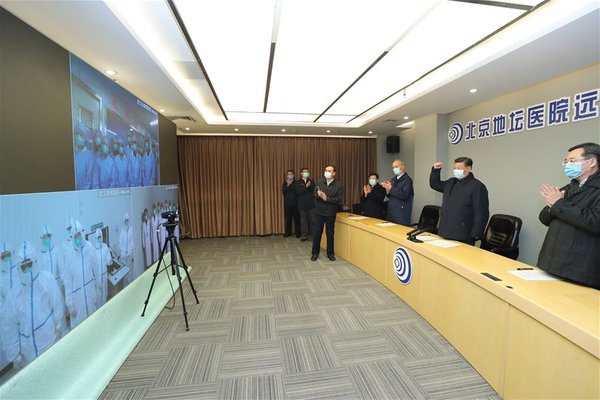
Xi Jinping makes video calls to hospitals in Wuhan receiving patients with severe conditions, hears reports on COVID-19 prevention and control, and extends regards to medical workers on the frontline, at Beijing Ditan Hospital in Beijing, capital of China, Feb. 10, 2020. Xi inspected the COVID-19 prevention and control work in Beijing on Feb. 10. [Xinhua/Ju Peng]
On Feb. 10, when the cumulative number of confirmed COVID-19 cases in Beijing reached 342, Xi put on his mask and visited a residential community, a hospital and a district disease prevention and control center. He held out his wrist to have his body temperature checked upon entering every location.
Xi chatted with residents in a street, asking them about the prices of vegetables.
"Let's not shake hands at this unusual time," Xi said. "We must have confidence that we can prevail over the epidemic."
"We absolutely can beat it," the residents responded.
A month later, Xi visited a residential community in Wuhan. At this time, daily new confirmed cases on the mainland had dropped to 24, but Wuhan still had 14,514 COVID-19 patients. The task of containment remained arduous.
Walking between apartment blocks, Xi looked up and waved to residents under lockdown who stuck out their heads from their windows and balconies to greet him.
"Let's keep it up! Hold on for a little longer!" Xi said.
Speaking at a symposium in Wuhan, he made a special request for officials to supply more fish, a favorite food of Wuhan people.
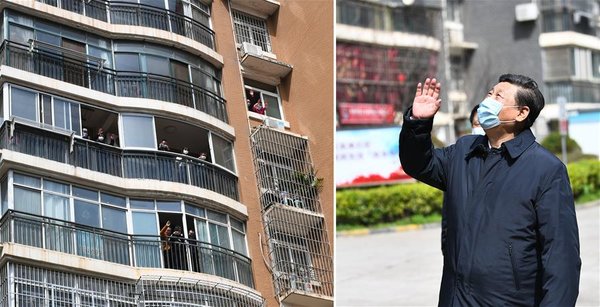
Combo photo shows Xi Jinping waving to residents who are quarantined at home and sending regards to them at a community in Wuhan, central China's Hubei Province, March 10, 2020. Xi went to Wuhan on March 10 to inspect COVID-19 prevention and control work there. [Xinhua/Xie Huanchi]
Andrey Ostrovsky, deputy director of the Institute of Far Eastern Studies at the Russian Academy of Sciences, said Xi's Wuhan inspection was a clear testament to the Party's principle of putting people's lives and health first.
Xi cares deeply about medical workers. He demanded maximum efforts to reduce the loss of life and instructed cadres to relieve medical workers' stress, provide for their basic needs and give them enough rest and encouragement.
At Huoshenshan Hospital, Xi spoke to fully gowned doctors by video link. "I can't see your whole faces as you are all wearing protective gowns and masks. But in my heart, you are the most beloved people," he said.
Chen Jing, a lead nurse of the hospital's intensive care unit, said she was touched by Xi's visit and felt stronger than ever with the leadership and people firmly standing by medical workers.
On International Workers' Day, Xi wrote to the staff of a household service company in central China. He lauded a wide range of working people from sanitation workers, deliverymen to workers producing anti-epidemic supplies. Their hard work and contributions, Xi said, had gathered tremendous strength to prevail over the epidemic.
On International Nurses Day, Xi applauded nurses who braved the danger to save lives during the COVID-19 fight. On China's Doctors' Day, Xi again lauded medical workers who fought tenaciously against the virus on the front line.
Xi was concerned about Chinese citizens' safety abroad and asked embassies, consulates, overseas Chinese associations and student unions to ramp up support. The government arranged flights to bring back Chinese students and other people in need from Iran, Italy, Britain and other countries.
Cadres, Xi said, must shoulder their responsibilities for the people. Those who disobey orders, be self-serving, fail to take on responsibilities or have undesirable conduct will be punished. In serious cases, the supervisors of wrongdoers will be held accountable too, Xi said.
On April 4, Xi led the nation of 1.4 billion to observe three minutes of silence for the lives lost to the coronavirus. This year's "two sessions" also opened with the mourning of the fallen, once again demonstrating the people-first spirit.
Global Fight
The virus respects no borders. From a luxurious cruise ship docking in Japan to a ski resort in the French Alps, from Casablanca's ancient city to downtown Manhattan and the Amazon rainforest, the pandemic has spread all over the world.
By Sept. 6, global COVID-19 cases had exceeded 26 million in more than 210 countries and regions, leaving over 870,000 people dead, according to the WHO tally.
Xi said public health security is a common challenge for humanity, which requires joint efforts from all countries.
This is in the spirit of building a community with a shared future for humanity, a vision put forward by Xi in 2013. Over the past seven years, he has been promoting the vision on the international stage. Amid the global anti-virus fight, the importance of this vision has been made clear to all.
On Jan. 7, Chinese scientists isolated the first novel coronavirus strain. On Jan. 12, the WHO acknowledged receiving the coronavirus full genome sequence from China.
Tedros said China identified the pathogen in record time and shared the genetic sequence with the WHO and other countries. This bought invaluable time for other regions around the world to gear up their response.
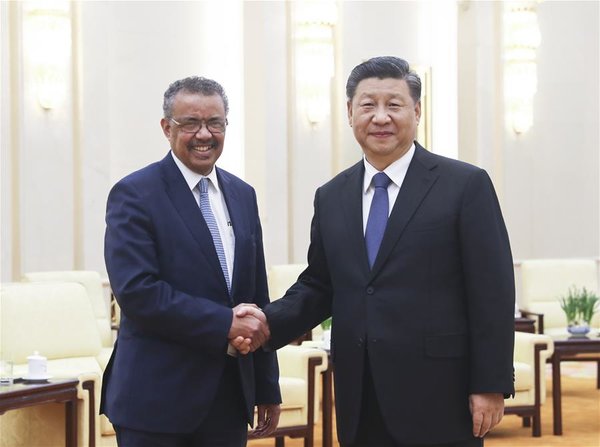
Xi Jinping meets with visiting World Health Organization (WHO) Director-General Tedros Adhanom Ghebreyesus at the Great Hall of the People in Beijing, capital of China, Jan. 28, 2020. [Xinhua/Ju Peng]
China also informed the United States of the outbreak in early January. A U.S. virus hunter came to China in late January to help battle the epidemic.
When China was bearing the full brunt of COVID-19's wrath, leaders of over 170 countries and 50 international and regional organizations expressed their support. A total of 77 countries and 12 international organizations provided assistance.
China fought the virus with openness and transparency as press conferences were held daily, sometimes several times a day, starting from Jan. 26.
Amid the epidemic, Xi met with Tedros, Cambodian Prime Minister Samdech Techo Hun Sen, Mongolian President Khaltmaa Battulga, and Pakistani President Arif Alvi in Beijing. Through video link, Xi met with European Council President Charles Michel and European Commission President Ursula von der Leyen.
Xi wrote back to Tedros and Bill Gates and exchanged letters with Argentine President Alberto Fernandez, Peruvian President Martin Vizcarra, Cambodian Prime Minister Samdech Techo Hun Sen and Mongolian Prime Minister Ukhnaa Khurelsukh.
Xi exchanged verbal messages with Kim Jong Un, chairman of the Workers' Party of Korea and chairman of the State Affairs Commission of the Democratic People's Republic of Korea. Xi sent a verbal message to Pakistani President Arif Alvi and exchanged messages with Bounnhang Vorachith, general secretary of the Lao People's Revolutionary Party Central Committee and president of Laos.
Xi also sent a congratulatory letter to the ninth ministerial meeting of the China-Arab States Cooperation Forum, urging efforts to advance cooperation in various fields including the pandemic response.
Since the start of the COVID-19 outbreak, Xi has conducted unprecedented "telephone diplomacy," having more than 60 phone conversations with over 50 foreign leaders.
These included those from Western countries such as British Prime Minister Boris Johnson and French President Emmanuel Macron; those from emerging-market countries — Russian President Vladimir Putin and South African President Cyril Ramaphosa; and those from developing countries like Pakistani Prime Minister Imran Khan, Ethiopian Prime Minister Abiy Ahmed Ali and Cuban President Miguel Diaz-Canel.
In the talks, Xi said this global public health emergency has driven home the urgent need to build a community with a shared future for humanity. It is only by working together that countries around the world can overcome the pandemic, he said.
As the virus spread, some countries and regions were hit particularly hard. Xi sent messages to their leaders, expressing sympathy.
"Unity is strength;" "Building a community of health for all" — these have been his messages to the world.
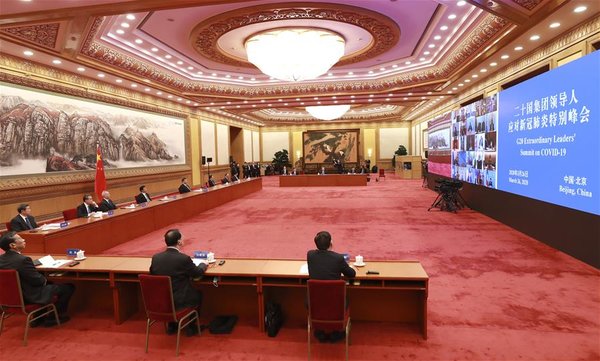
Xi Jinping delivers a speech titled "Working Together to Defeat the COVID-19 Outbreak" while attending the G20 Extraordinary Virtual Leaders' Summit on COVID-19 via video link in Beijing, capital of China, March 26, 2020. [Xinhua/Pang Xinglei]
In late March, at an extraordinary G20 summit held via video link, Xi called for resolutely fighting an all-out global war against the COVID-19 outbreak, devising a collective response for control and treatment at the international level, supporting international organizations and enhancing international macroeconomic policy coordination to prevent a recession.
Kuhn, the U.S. scholar, said Xi's proposals to enable humanity as a whole to win the battle against this major infectious disease give meaning to the vision of an international community with a shared future.
COVID-19 has become the worst global public health incident since the end of World War II.
In May, at the World Health Assembly's opening held via video link, Xi mourned for every life lost to COVID-19 and expressed condolences to the bereaved families. He announced China's five measures to support the global COVID-19 fight.
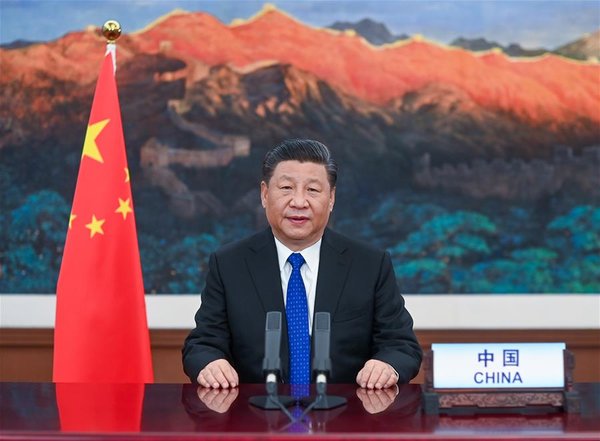
Xi Jinping delivers a speech at the opening of the 73rd World Health Assembly via video link in Beijing, capital of China, May 18, 2020. [Xinhua/Li Xueren]
Xi said China will make its COVID-19 vaccine a global public good when available, contributing to vaccine accessibility and affordability in developing countries.
In June, Xi chaired an extraordinary China-Africa summit on solidarity against COVID-19 via video conference and called for staying committed to fighting COVID-19 together, enhancing China-Africa cooperation, upholding multilateralism and taking China-Africa friendship forward.
"We oppose the politicization and stigmatization of COVID-19, and we oppose racial discrimination and ideological bias. We stand firm for equity and justice in the world," Xi said.
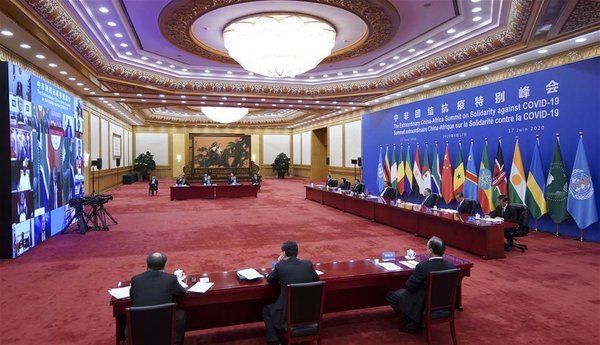
Xi Jinping chairs the Extraordinary China-Africa Summit on Solidarity against COVID-19 and delivers a keynote speech at the summit via video link in Beijing, capital of China, June 17, 2020. [Xinhua/Ding Haitao]
Whether it is taming the virus or achieving economic recovery, the world cannot succeed without solidarity, cooperation and multilateralism, Xi said in a message to a high-level video conference on Belt and Road international cooperation.
The right approach to tackling global crises and realizing long-term development is through greater connectivity, openness and inclusiveness. This is where Belt and Road international cooperation can make a big difference, he said.
At the start of the outbreak, China helped countries like the United States and Japan evacuate their nationals from Wuhan. As the pandemic spread, China donated funds to the WHO totaling 50 million U.S. dollars and sent 33 medical expert teams to 31 countries from late February to the end of August.
The Chinese government has sent much-needed medical supplies to over 150 countries and international organizations and facilitated foreign procurement in China. Non-governmental organizations and companies also gave a helping hand.
Hassan Ahmadian, assistant professor of Middle East and North Africa studies at the University of Tehran, said China's donations and exchange of expertise with affected countries, including Iran, stand out not only as a humanitarian gesture but also as responsible behavior on the part of a major country.
China has shared technical documents on treatment protocols and containment strategies with 180 countries and over 10 international and regional organizations. Beginning in March, Chinese experts held almost daily video conferences with their foreign peers. China's pioneering use of makeshift hospitals has also been adopted around the world, including in New York's iconic Central Park.
Xi had four phone calls with Putin in as many months. Putin said by providing timely assistance to other countries affected by COVID-19, China has set an example for the international community and responded, loud and clear, to the provocation and stigmatization by some country. Putin also said Russia will stand firmly by China's side.
Rise Above Trials and Tribulations
Xi said national rejuvenation would not come easy and great struggles must be fought to realize the great dream.
The epidemic brought severe challenges to the world's largest developing country, but showed the importance of following its own path and adhering to reform and opening up.
Initially, medical materials were in short supply and weak links in hospital protection led to infections among health workers. Practices of bureaucratism and formalities for formalities' sake were exposed at local levels.
While fighting the coronavirus as the most pressing task, Xi pushed for building institutions with a long-term impact.
Last year, the fourth plenary session of the 19th CPC Central Committee adopted a decision on institution building. Xi said China must use the strength of its institutions to cope with risks and challenges.
"The epidemic was a big test for China's system and capacity for governance," Xi said bluntly. "We must draw experience and learn our lessons."
He said the exposed shortcomings told of the need to improve the national emergency management system and boost the nation's ability to handle urgent and challenging tasks.
In February, Xi demanded efforts to strengthen public health legislation, reform the disease prevention and control system, and improve public health services when he chaired a meeting of the Central Commission for Comprehensively Deepening Reform.
Two months later, the commission's meeting adopted documents on the provision of public health emergency supplies and on oversight of medical insurance funds.
During the "two sessions," when joining deliberations with lawmakers from Hubei, Xi stressed fortifying the public health protection network.
Several priorities were in the spotlight: reform the disease prevention and control system; boost epidemic monitoring, early warning and emergency response capacity; advance the treatment system for major epidemics; improve public health emergency laws and regulations; and carry out patriotic public health campaigns.
The COVID-19 pandemic is dealing a heavy blow to the world economy. More than four out of every five people in the global workforce of 3.3 billion have been affected by full or partial workplace closures, according to a report by the International Labour Organization in early April.
Xi told a symposium on economic and social work that the pandemic will accelerate the profound changes the world is undergoing, changes unseen in a century.
The Chinese economy shrank 6.8 percent in the first quarter. On the day the statistics were released, Xi chaired a leadership meeting that pointed out the first quarter of 2020 was "extremely unusual." The sudden COVID-19 outbreak had an unprecedented impact on China's economic and social development.
On dealing with the impact on the economy, Xi said: "We must stay confident and not be frightened by problems and difficulties."
"I have said many times that China is a big country with enormous resilience, huge potential and great flexibility in development," he added.
Xi said at the "two sessions" that China has set no specific target for economic growth this year as the sudden COVID-19 outbreak has created challenges to completing the tasks in this final year of the 13th Five-Year Plan.
He emphasized the importance of maintaining stable and sound economic performance in the long run, and devised a series of strategic measures including the creation of a new development pattern in which domestic and foreign markets boost each other, with the domestic market as the mainstay.
Since early February, Xi has been giving instructions on stabilizing the economy.
From March to August, he visited villages, rural families and businesses on inspection tours to coordinate regular epidemic control with economic and social development.
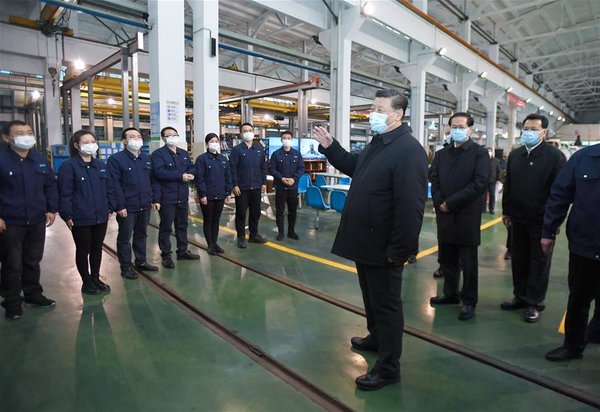
Xi Jinping visits an industrial park which produces high-end auto parts and molds in Ningbo, east China's Zhejiang Province, March 29, 2020. Xi inspected Zhejiang Province from March 29 to April 1. [Xinhua/Yan Yan]
In Zhejiang Province, Xi chatted with workers by an assembly line, asking if their return to work had gone smoothly, particularly if they had received their paychecks. He demanded the prices of daily necessities and the income of farmers remain stable.
In Shaanxi Province, he encouraged companies to overcome the negative impact of COVID-19 and actively expand markets. In the village of Jinmi, Xi lauded the local black fungus industry. This went viral online, and 20 million people visited the e-commerce sites, where over 20 tonnes of black fungus were sold out in quick succession.
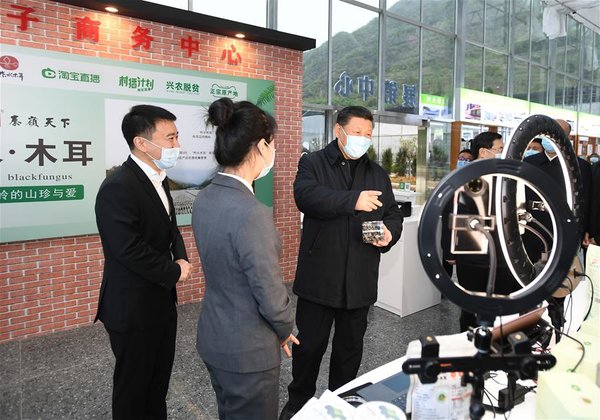
Xi Jinping learns about development of the black fungus industry at a training center in Jinmi Village of Xiaoling Township in Zhashui County, Shangluo City, northwest China's Shaanxi Province, April 20, 2020. Xi inspected Shaanxi Province from April 20 to 23. [Xinhua/Xie Huanchi]
In Shanxi Province, Xi called on businesses to make up for lost time with the proper safety precautions in place.
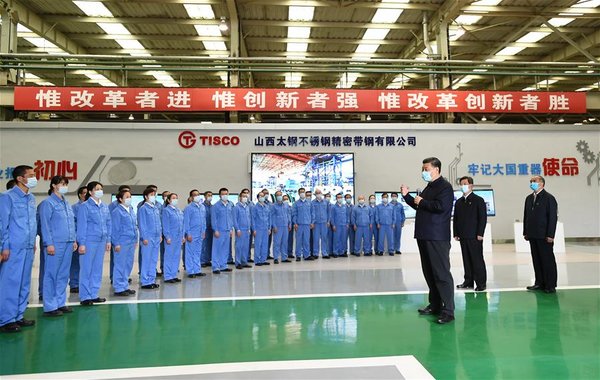
Xi Jinping speaks with workers during a research tour in a stainless steel manufacturer in Taiyuan, north China's Shanxi Province, May 12, 2020. Xi inspected Shanxi Province from May 11 to 12. [Xinhua/Xie Huanchi]
In Ningxia Hui Autonomous Region, he said no ethnic minority group should be left behind in building a moderately prosperous society in all respects. He also urged efforts to maintain epidemic control measures while accelerating the return to normalcy in people's daily lives.
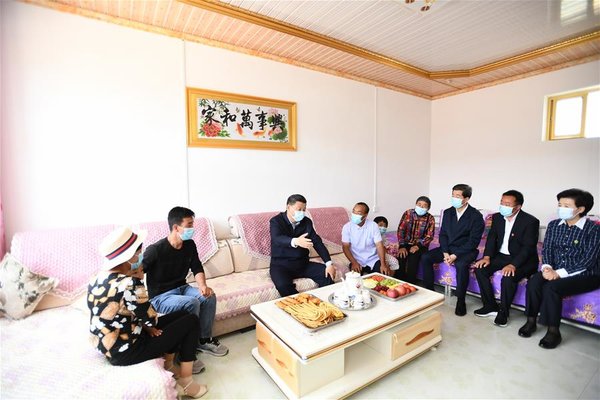
Xi Jinping talks with Liu Kerui, a villager of the Hui ethnic group, and his family in Hongde Village of Wuzhong, northwest China's Ningxia Hui Autonomous Region, June 8, 2020. Xi inspected Ningxia from June 8 to 10. [Xinhua/Xie Huanchi]
In Jilin Province, Xi took a particular interest in the employment of college graduates and migrant workers and ordered Party committees and governments at all levels to actively create favorable conditions for college graduates to find jobs.
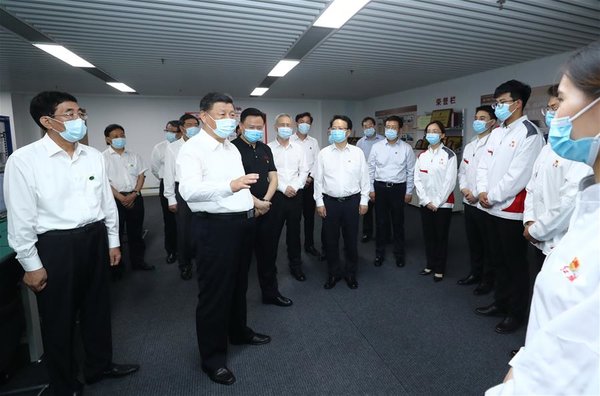
Xi Jinping talks with employees who have recently graduated from universities at the R&D headquarters of automaker FAW Group in Changchun, northeast China's Jilin Province, July 23, 2020. Xi inspected Jilin Province from July 22 to 24. [Xinhua/Ju Peng]
The Chinese economy bounced back to growth in the second quarter of 2020, expanding 3.2 percent year on year. Major indicators returned to growth, economic performance steadily recovered and market expectations were positive in general.
Foreign direct investment into the Chinese mainland, in actual use, also grew 8.4 percent year on year in the second quarter, indicating foreign investors' growing confidence in the Chinese market.
By mid-April, over 99 percent of major industrial enterprises in China had reopened. They included foreign companies and their local suppliers like Apple, Tesla and Volkswagen.
Writing back to Global CEO Council members' representatives in July, Xi said those CEOs had made the right choice by staying rooted in China.
Six days later, when he attended a symposium with entrepreneurs, Xi said: "We must shore up confidence, rise up to challenges, work hard to recover the loss caused by COVID-19, and strive for good economic development for the whole year."
The spring and summer of 2020 represent an unusual chapter in the Chinese nation's journey toward rejuvenation.
Under Xi's leadership, the Chinese people are united to contain the COVID-19 outbreak. With epidemic control measures in place, China has secured a bumper summer grain harvest, overcome floods and made solid progress to eliminate poverty. In the meantime, China, as a major and responsible country, is actively advancing global cooperation against the pandemic. During this process, China's socialist system has demonstrated its strengths.
In this extraordinary year, Xi has taken on great responsibility, firmly fulfilled his commitment to the people, and worked hard to eradicate poverty and achieve a moderately prosperous society in all respects.
"The Chinese nation has experienced many hardships in its history, but it has never been weighed down. Instead, it has grown stronger and stronger through trials and tribulations," Xi said.
(Source: Xinhua)

 京公网安备 11010102004314号
京公网安备 11010102004314号